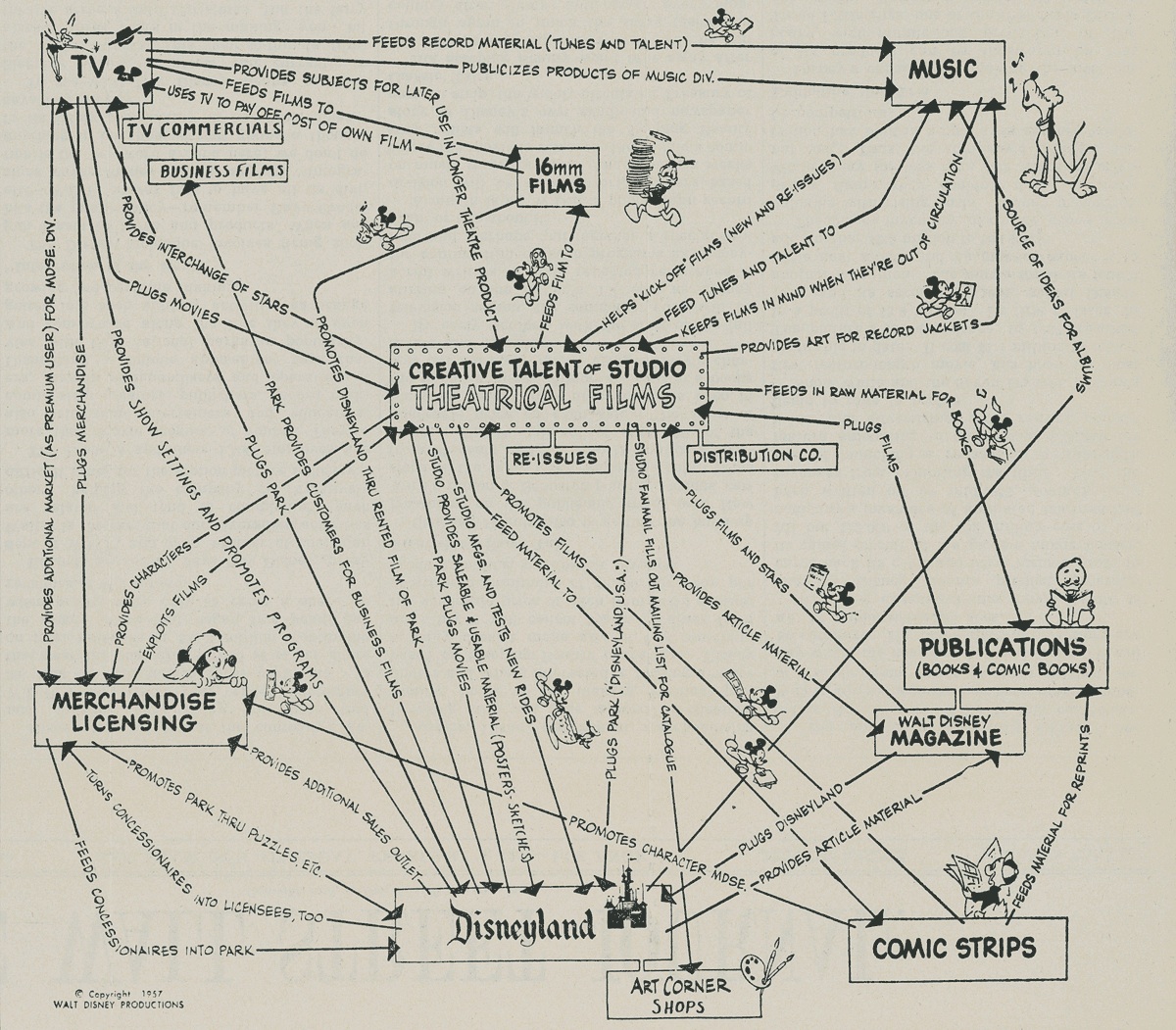I love [this graphic](http://johnaugust.com/wp-content/uploads/2014/07/disney_chart.jpg) from 1957 showing how the various elements of the Walt Disney company fit together.
You could make the same chart today.
Here is a partial list of the properties Disney owns in 2014:
Features:
* Walt Disney Pictures
* Touchstone Pictures
* Disneynature
* Disney Animation Studios
* Pixar
* Lucasfilm
* Marvel
* The Muppets
* DreamWorks (distribution)
Music:
* Walt Disney Records
* Hollywood Records
* Disney Music Publishing
Destinations:
* Disneyland/Disneyworld worldwide
* Disney Cruise Line
* Disney Vacation Club
Theatrical Group:
* Disney Theatrical Productions
* Disney on Ice
* Disney Live
Consumer Products:
* Disney Store
* Disney Baby
* The Baby Einstein Company
Books:
* Disney-Hyperion
* Marvel Press
Broadcasting:
– ABC Television Network
– ABC Family Worldwide
– Live Well Network
– A+E Networks (50%)
– Disney Channels Worldwide
– Radio Disney
– Disney Television Animation
– ESPN Inc. (80%)
– Hulu (32%)
– A+E Networks (50%), includes Lifetime and History
Online/Interactive:
– Disney Infinity
– Disney.com
– Maker Studio
Comics:
– Marvel
– Disney Comics
Almost every one of these items is a huge business just by itself. Which raises the question: If one were to make a new version of the 1957 chart, would Theatrical Films still deserve the central marquee spot?
Yes.
I’d argue that in 2014, film properties are probably still worth keeping near the middle of any Disney flowchart. The company makes money in many ways, but feature films are still the key drivers. You don’t get Cars merchandise without the movie.
The success of Frozen is an example of how Disney can capitalize on a hit film by using it in other divisions: Disneyland attractions, TV tie-ins (Once Upon a Time), music, books, merchandise, and possibly a Broadway musical.
As screenwriters, there are pros and cons to this kind of corporate synergy.
Giant corporations like Disney will keep making movies because it feeds the engine — and the better the movies, the bigger the multiplier in success. You can criticize individual films, but the juggernaut franchises have sprung from well-executed movies, and all of these movies began with screenwriters.
The challenge for screenwriters is that it’s increasingly difficult to get momentum on any movie that doesn’t seem to have the potential to work across divisions. An R-rated blockbuster like The Matrix can’t become a theme park ride, so why spend $100 million to make it?
Looking at the list of [top-grossing R-rated movies](http://www.boxofficemojo.com/alltime/domestic/mpaa.htm), Warners and New Line made seven of the top 10. With talk that [Fox may buy Warners](http://www.latimes.com/entertainment/envelope/cotown/la-et-ct-time-warner-white-knight-fox-20140722-story.html#page=1), I wonder if they would still be making those movies post-merger.
